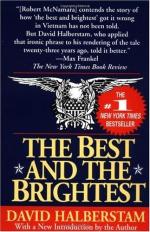
|
| Name: _________________________ | Period: ___________________ |
This quiz consists of 5 multiple choice and 5 short answer questions through Chapters 15-16.
Multiple Choice Questions
1. What had McNamara done by the time he took over as Secretary of Defense?
(a) Consulted with Kennedy about his goals and methods.
(b) Instituted successful reforms at Ford.
(c) Studied and identified the problems at the Pentagon.
(d) Reviewed American foreign policy.
2. What was the logic behind the U.S.'s actions after the 1961 fact-finding mission?
(a) Wait for the Vietnamese elections.
(b) Inaction would allow trade to develop.
(c) A show of force would intimidate the Vietcong.
(d) Further delay would defuse the situation.
3. What does Halberstam say was the problem with the Kennedy administration's pragmatism?
(a) It did not have real-world experience.
(b) It was grounded in academic theory.
(c) It was not backed with muscular diplomacy.
(d) There were too many crises at once.
4. What was McNamara beginning to suspect in Vietnam?
(a) The accuracy of bleak military reports.
(b) The patience of the American electorate.
(c) The capacity for victory in a guerilla war.
(d) Diem's trustworthiness.
5. What issue had Kennedy and Dean Rusk had to discuss when Dean Rusk was offered the Secretary of State job?
(a) Family values.
(b) Rusk's Judaism.
(c) Finances.
(d) Personal morality.
Short Answer Questions
1. How does Halberstam say Dean Rusk felt in the Kennedy administration?
2. Why didn't Kennedy formulate a China policy, in Halberstam's account?
3. Whose theories had been used as the basis for expanded militarization in the late 1940s?
4. What state does Halberstam say the Vietcong were in when Kennedy sent the fact-finding mission in 1961?
5. What did the fact-finding mission discover at about the time of the problem with the Buddhist monks?
|
This section contains 354 words (approx. 2 pages at 300 words per page) |

|




